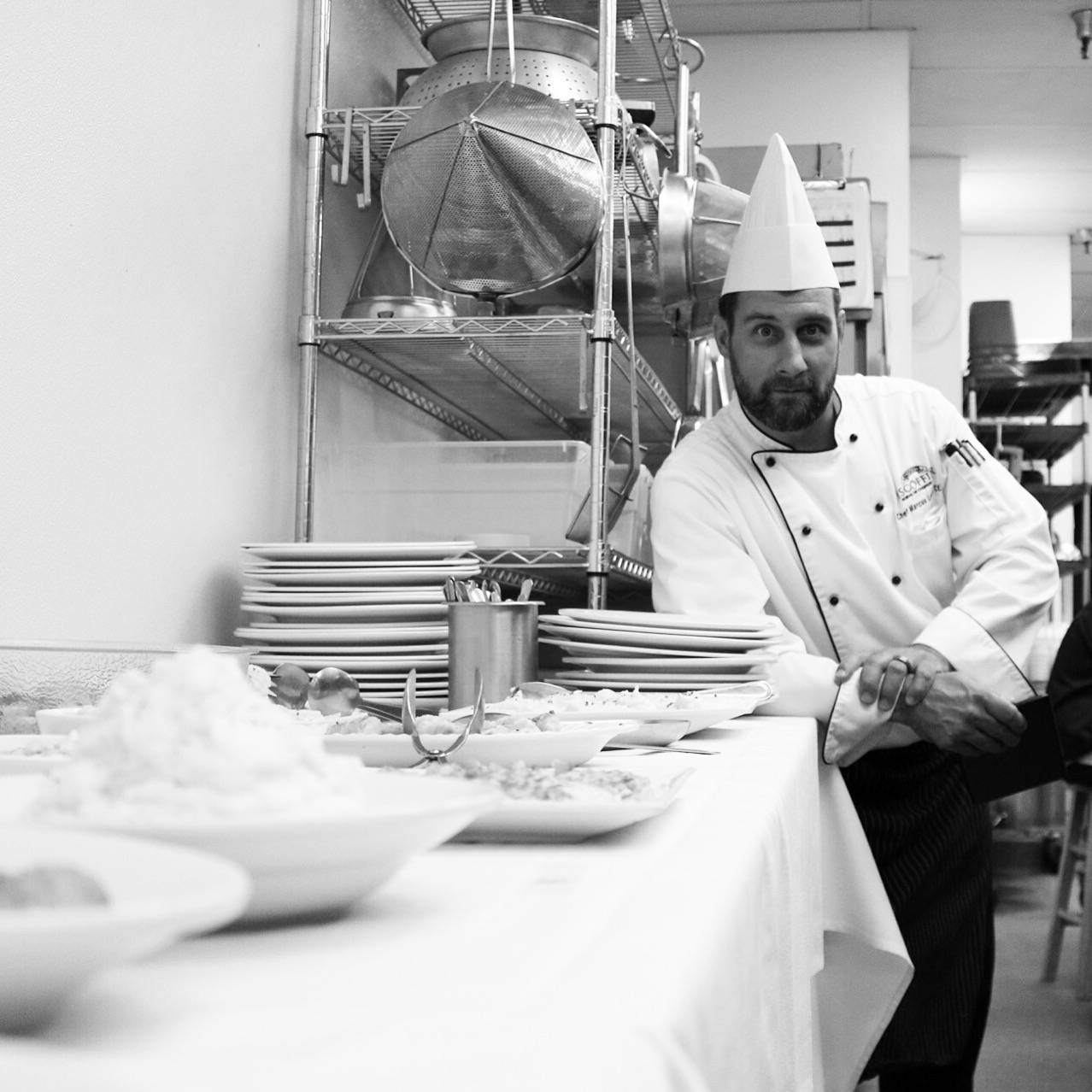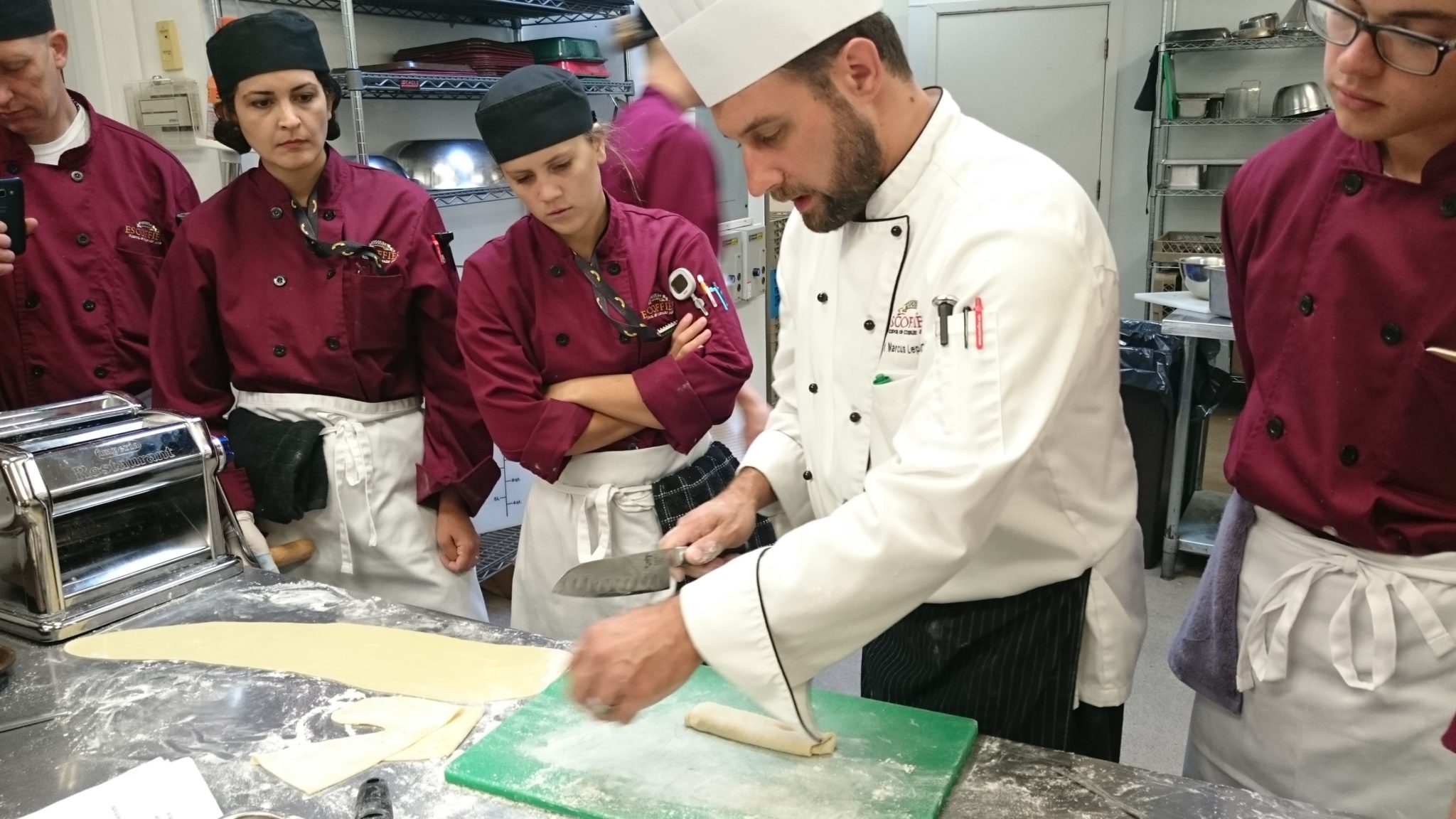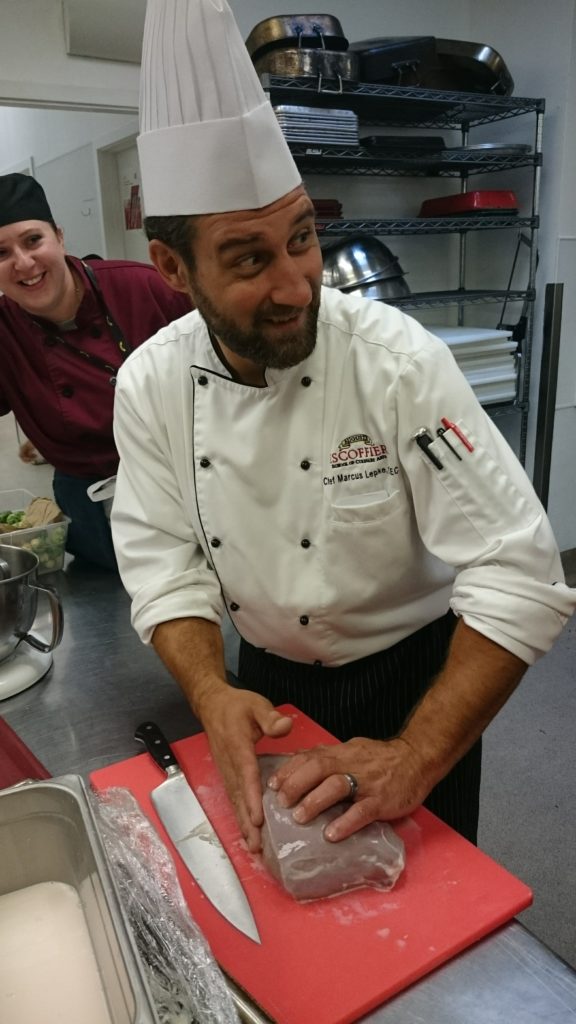By: Benjamin Faurer
Chef Marcus Lepke has worked in the culinary arts for over 20 years. His journey began in his home country of Germany and has spread all over the world from there. Following graduation from culinary school, he spent a number of years traveling Europe. He studied the art of handmade pasta in the towns of Italy, enjoyed wine in the countryside of Spain, and learned from the master chefs of France.

Photo by: Alex Cross
During his career, Chef Marcus trained under many of the world’s best chefs, having worked for Gordon Ramsey for a number of years, made a meal with the incredible Paul Bocuse, and was literally a “chef of kings” (what did they call Auguste Escoffier…). Today, he heads a private catering company in addition to his duties as an Escoffier instructor, with even more promise for a bright future ahead of him.
As my first Boulder culinary school teacher, I really hope to work with him again. It was a privilege to interview him and give you a small glance into his incredible journey in our profession. I got a chance to sit down with Chef Marcus and discuss his three pieces of advice for success in this industry: how it is very important to continue to learn, to not get stuck in your ways and to forever be open to new ideas.
Auguste Escoffier School of Culinary Arts: Why did you decide to get into culinary arts?
Marcus Lepke: I had a silly cousin who loved it and told me I should get into it. So I just did it.
AESCA: What was your biggest challenge in culinary school?
ML: The physical abuse of so much work and mastering time management.
AESCA: What was the best part about school?
ML: To work with many different people from all walks of life.
AESCA: What was the first thing you did after graduation? I know you went and trained in Spain, Italy and France in the years following.
ML: First thing after culinary school, I went to Frankfurt where I started as a commis de cuisine. I was in the Michelin Star Restaurant Francais at the Steigenberger Hof Hotel. After working there for 1 ½ years, I wanted to be a demi-chef, the next rank, but my chef didn’t see that position available anytime soon.
I decided to go and check around to see what was available, and a co-worker mentioned that the chef at a different hotel was looking for somebody. I contacted him and although he couldn’t hire me in that position, he promised me that if I don’t screw up too much, I would be his demi-chef in a few months time. So we had an agreement and I switched hotels to be at the private hotel of the King of Spain.
AESCA: Who was the most influential chef you worked for?
ML: Definitely Chef Klaus Peichl. He was the executive chef of the private hotel of kings in Frankfurt. I learned so much from him, under him, with him. It was incredible.

Photo by: Alex Cross
AESCA: How many years did you work there?
ML: I worked there for 3 ½ years. From a demi-chef to a chef de partie, from a chef de partie to a sous-chef.
AESCA: And I know you mentioned to us in class you had no food budget at the hotel, so you guys really got to do what you wanted.
ML: Yes, it was awesome.
AESCA: What is your most favorite dish to prepare, both from back in your past and now?
ML: Definitely being a classically French trained chef, you know one of my favorite dishes come from the French. Making a Chateaubriand with a nice demi-glace with some nice sides, for me, is a feast of a King. But traveling around the world, I like bouillabaisse, I like paella. You know there are so many dishes from so many areas, so many countries, which are just incredible. A simple pasta made from scratch, tossed in a little bit of olive oil and fresh Parmigiano Reggiano and some fresh cracked pepper is a delight.
If you make a perfect egg ravioli with a liquid egg yolk inside, a little brown butter and fried sage it’s mind-blowing. It’s not a lot. It’s just pasta but if it’s done perfectly, it’s downright sinful. You can have something as elaborate as coq au vin, which takes 2-3 days to prepare, and I’m going to lick the plate with my tongue!
But fresh pasta, ravioli I can make in 2 hours and it’s still going to be perfect. That’s definitely one thing that I also enjoy about cooking, that you have that variety. You’re doing every day something different, a different country, a different region, a different culture. It never gets boring. As a chef, you can live your lifetime and probably two more lifetimes on top of that before you get bored. And that is for me something, if I get bored, I’m not happy. And I think that’s why I like my job; because it doesn’t get boring. I mean, I come here and I learn from students [and] I think that’s incredible.
AESCA: Along with all of that, what inspired you to become a teacher here at Escoffier? What was your journey here?
ML: To learn from great chefs and to work with great chefs is definitely something I’m very humble about. I think I can give that back to other students. I was fortunate enough to learn from great Chef’s so now I have an opportunity to give that knowledge back.
AESCA: Yes, I would love to spend years working with you.
ML: It is a journey. And to meet other chefs, to talk to other chefs, to sit down at the chef’s table with other chefs and to talk about a dish. To talk about how you became a chef, those are incredible moments. To shake the hand of Paul Bocuse, those are things that every chef draws inspiration and energy from. It’s fun. It’s exciting. I just love it!
AESCA: What is your most favorite part about teaching and what is your biggest challenge?
ML: The best thing about here is being a classically French trained chef and working for Escoffier Schools, I think that’s a pretty good fit. And Boulder is a pretty nice place too. Everywhere you live, wherever you work, you have to adjust based on culture and people. That’s what life’s about.
AESCA: What is the best advice you have for new students coming into Escoffier?
ML: It would probably be difficult to pinpoint it but my most important advice is to take notes. There is such an overwhelming amount of information pouring onto you. There is literally no way to keep it all memorized. And that’s, by the way, the reason we give out little notebooks to the students.
AESCA: What is your advice to graduating students? People who are starting out into the New World?
ML: I certainly say that being a graduate from a culinary school does not entitle you to be an executive chef. Be humble because culinary school takes 8-9 months, maybe a year at the most, and then your apprenticeship takes 3 years. Then you are a Commis de Cuisine, which means you’re just somebody but you’re still nothing. You’re still learning, and I think this is the way to go. You’re just beginning to learn.
I think you have a very good foundation but that doesn’t mean that you can cook; that you KNOW how to cook. You’ve had too little exposure and I think that if you can keep that in the back of your mind, that certainly will bring you much further, much faster than you think. I think being humble is a part of being a good chef.
AESCA: Yes, I mean even all the chefs who are on Chef’s Table on Netflix, the Michelin Stars, the top 10 restaurants in the world. Even they are very humble. Chef Massimo Bottura is probably one of the nicest guys ever and he’s #1 right now.
ML: It is very important, because it’s not just how you reflect yourself to the public, to your employees. It’s a growing process. If you are humble, I think you have more room and potential to grow even further than displaying your wisdom and saying, “I know it all, I’ve seen it all”. I think if you do that, you get stuck easily somewhere and your learning process stops. Again, this is one of the greatest benefits of being a chef is that there’s unlimited learning. Unlimited exposure. So, if you set yourself a border there because of how you behave and how you see yourself…you just get stuck.




